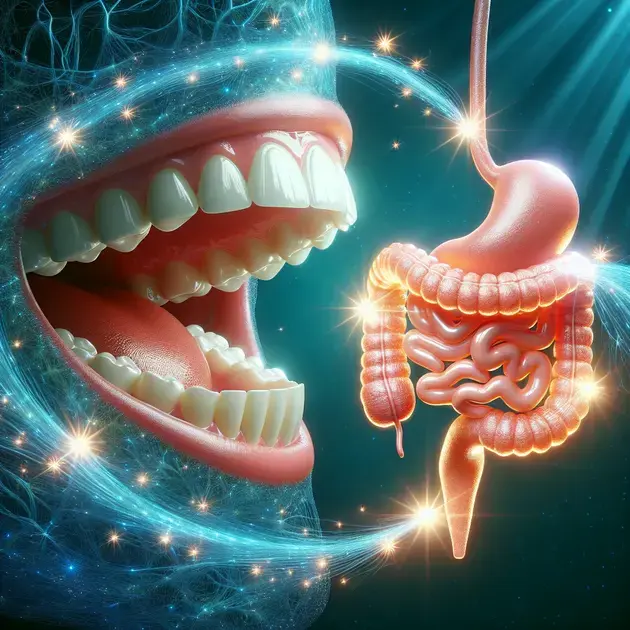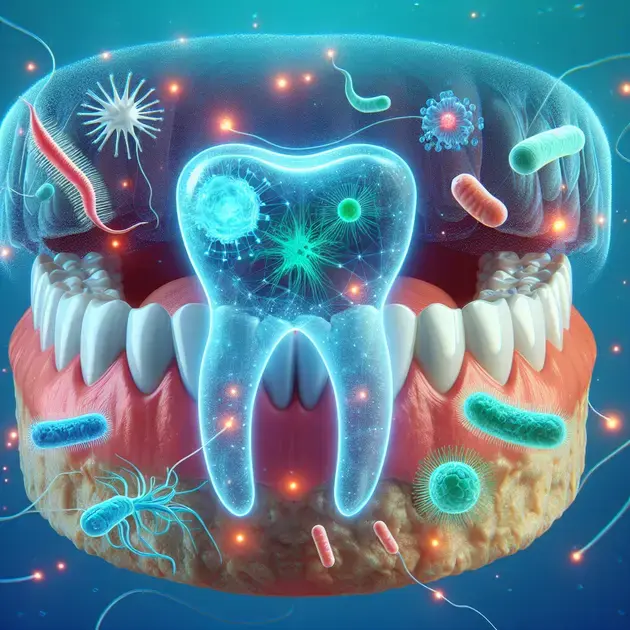When it comes to improving oral health, the use of mouth probiotics is gaining traction as a natural and effective solution.
Recent studies have shown that incorporating probiotics into oral care routines can help maintain a healthy balance of bacteria in the mouth, leading to reduced risk of gum disease and cavities.

The Benefits of Mouth Probiotics for Oral Health
Probiotics are live bacteria and yeasts that are beneficial for your health, especially your digestive system. When it comes to oral health, mouth probiotics can also play a significant role in maintaining a healthy mouth. These probiotics help balance the oral microbiome, which is essential for preventing oral health issues such as bad breath, cavities, and gum disease.
One of the key benefits of using mouth probiotics is their ability to crowd out harmful bacteria in the mouth. By introducing beneficial bacteria, probiotics can help maintain a balanced oral microbiome and reduce the risk of developing oral health problems. Additionally, some studies have shown that certain strains of probiotics can help reduce inflammation in the gums, further supporting overall oral health.
To incorporate mouth probiotics into your oral care routine, consider using probiotic toothpaste or mouthwash. These products are specifically formulated to deliver beneficial bacteria to your mouth, supporting a healthy oral microbiome. Look for products containing strains like
Lactobacillus reuteri
or
Bifidobacterium lactis
, which have been shown to be effective for oral health.
Another way to introduce mouth probiotics is by consuming probiotic-rich foods or supplements. Yogurt, kefir, and kombucha are all excellent sources of probiotics that can benefit your oral health. Alternatively, you can take a daily probiotic supplement that is specifically formulated for oral health.
Overall, the benefits of mouth probiotics for oral health are numerous. By incorporating these beneficial bacteria into your oral care routine, you can help maintain a healthy mouth and prevent common oral health issues.
How to Incorporate Mouth Probiotics into Your Oral Care Routine
Incorporating mouth probiotics into your oral care routine is a simple and effective way to support your oral health. Follow these steps to start reaping the benefits of probiotics for your mouth:
Step 1: Choose the Right Products
Begin by selecting probiotic toothpaste or mouthwash that contains beneficial strains of bacteria. Look for products that are specifically formulated for oral health and contain strains like
Streptococcus salivarius
or
Lactobacillus reuteri
.
Step 2: Use Probioitc Products Regularly
Incorporate probiotic toothpaste or mouthwash into your daily oral hygiene routine. Use these products as directed to ensure you are introducing beneficial bacteria to your mouth consistently.
Step 3: Consume Probiotic-Rich Foods
Include probiotic-rich foods in your diet to support a healthy oral microbiome. Foods like yogurt, kefir, and sauerkraut can all contribute to the beneficial bacteria in your mouth.
Step 4: Consider Probiotic Supplements
If you struggle to consume enough probiotic-rich foods, consider taking a daily probiotic supplement. Look for a supplement that contains strains beneficial for oral health.
Step 5: Maintain Good Oral Hygiene Habits
Remember that probiotics are not a substitute for good oral hygiene habits. Continue to brush and floss regularly, and visit your dentist for routine check-ups to ensure optimal oral health.
Understanding the Science Behind Mouth Probiotics and Oral Health
The science behind mouth probiotics and their impact on oral health is fascinating. Research has shown that the oral microbiome plays a crucial role in maintaining a healthy mouth, and probiotics can help support this balance.
Studies have demonstrated that certain strains of probiotics can inhibit the growth of harmful bacteria in the mouth, reducing the risk of cavities and gum disease. Additionally, probiotics have been shown to reduce inflammation in the gums, supporting overall gum health.
One of the key mechanisms by which mouth probiotics benefit oral health is through competitive exclusion. By introducing beneficial bacteria into the mouth, probiotics can crowd out harmful bacteria and help maintain a balanced oral microbiome.
Furthermore, probiotics can help support the immune system in the mouth, reducing the risk of infections and inflammatory conditions. This can contribute to overall oral health and may even have systemic health benefits beyond the mouth.
Overall, the science behind mouth probiotics and oral health is still evolving, but the research conducted so far suggests that incorporating probiotics into your oral care routine can have significant benefits for your oral health.

The Role of Mouth Probiotics in Preventing Cavities
When it comes to oral health, the use of mouth probiotics has gained attention for their potential role in preventing cavities. Probiotics are live bacteria and yeasts that are beneficial for health, especially the digestive system. In the case of oral probiotics, specific strains such as Lactobacillus and Bifidobacterium can help maintain a healthy balance of bacteria in the mouth, which is essential for preventing cavities.
One way in which mouth probiotics work to prevent cavities is by competing with harmful bacteria that cause tooth decay. By introducing beneficial bacteria into the oral cavity, probiotics can inhibit the growth of cavity-causing organisms, thus reducing the risk of developing cavities. This competitive exclusion mechanism is a key factor in the effectiveness of mouth probiotics in maintaining oral health.
Furthermore, mouth probiotics can also help strengthen the teeth and gums. Some strains of probiotics have been shown to support the remineralization of tooth enamel, making the teeth more resistant to acid attacks that lead to cavities. Additionally, probiotics can reduce inflammation in the gums, promoting overall oral health and potentially lowering the risk of gum disease.
Incorporating mouth probiotics into your oral care routine can be a proactive approach to cavity prevention. Whether in the form of probiotic-rich foods, supplements, or oral probiotic products, ensuring a healthy balance of bacteria in the mouth is beneficial for long-term oral health. Consult with your dentist or healthcare provider to determine the best probiotic options for your individual oral health needs.
Overall, the role of mouth probiotics in preventing cavities is a promising area of research and practice in the field of oral health. By understanding how probiotics can support a healthy oral microbiome and contribute to cavity prevention, individuals can take proactive steps towards maintaining a bright and healthy smile.
Exploring the Connection Between Gut Health and Oral Health
The connection between gut health and oral health is a topic of growing interest in the field of medicine and dentistry. Research has shown that the health of the gut microbiome, which consists of trillions of beneficial bacteria in the digestive tract, can influence various aspects of overall health, including oral health. The intricate relationship between the gut and the mouth highlights the importance of maintaining a healthy balance of bacteria in both areas.
Imbalances in the gut microbiome can manifest in oral health issues such as cavities, gum disease, and bad breath. When the gut microbiome is disrupted, it can impact the immune system and inflammation levels, which in turn affect oral health. By promoting a healthy gut through a balanced diet, probiotics, and lifestyle choices, individuals can positively influence their oral health as well.
Conversely, poor oral hygiene and dental problems can also contribute to imbalances in the gut microbiome. Oral infections, inflammation, and untreated cavities can lead to the spread of harmful bacteria from the mouth to the gut, impacting overall gut health. Maintaining good oral hygiene practices, regular dental check-ups, and addressing oral health issues promptly are essential for preserving the balance of bacteria in the gut.
Understanding the connection between gut health and oral health underscores the importance of a holistic approach to overall well-being. By taking care of both the gut and the mouth, individuals can support a symbiotic relationship between these two systems and promote optimal health outcomes. Incorporating probiotics for both gut and oral health can be a beneficial strategy for maintaining a balanced microbiome and preventing related health issues.
In conclusion, exploring the connection between gut health and oral health reveals the intricate interplay between these two systems and highlights the significance of holistic health practices. By prioritizing the balance of bacteria in the gut and the mouth, individuals can work towards achieving a healthier and happier life.
Conclusion
As we delve into the realm of oral health, the utilization of mouth probiotics emerges as a noteworthy contender in the realm of cavity prevention. Through the introduction of specific beneficial strains such as Lactobacillus and Bifidobacterium, mouth probiotics play a pivotal role in maintaining a harmonious bacterial balance within the mouth, thereby acting as a preventive shield against cavities.
Furthermore, the efficacy of mouth probiotics in cavity prevention lies in their ability to outcompete detrimental bacteria responsible for tooth decay. By fostering an environment rich in beneficial bacteria, probiotics impede the proliferation of cavity-causing organisms, effectively diminishing the likelihood of cavity development. This competitive exclusion mechanism stands as a cornerstone of mouth probiotics’ effectiveness in upholding oral health.
Moreover, the multifaceted benefits of mouth probiotics extend beyond cavity prevention to fortifying the resilience of teeth and gums. Certain probiotic strains facilitate the remineralization of tooth enamel, bolstering teeth against acid attacks that instigate cavities. Additionally, probiotics exhibit anti-inflammatory properties in the gums, fostering comprehensive oral health and potentially curbing the risk of gum disease.



